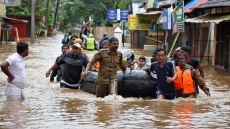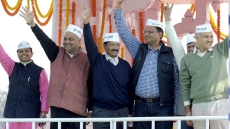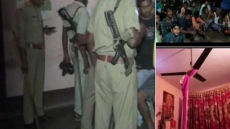Senior journalist, author and human rights activist Kuldip Nayar died at a hospital here, his family said on Thursday. He was 95.
Nayar breathed his last at the Escorts Hospital at 12.30 a.m. The cremation will take place at 1 p.m. on Thursday afternoon.
Born on August 14, 1923, in Sialkot (Pakistan), Nayar was among the country's first syndicated columnists and wrote several books.
He was appointed High Commissioner to the UK in 1990 and nominated to the Rajya Sabha in 1997.
Kuldip Nayar was an intellectual giant of our times. Frank and fearless in his views, his work spanned across many decades. His strong stand against the Emergency, public service and commitment to a better India will always be remembered. Saddened by his demise. My condolences.
— Narendra Modi (@narendramodi) August 23, 2018
Nayar started his journalistic career with the Urdu daily "Anjam" in 1948. He worked in the Press Information Bureau as a Press Officer to then Home Ministers Govind Ballabh Pant and Lal Bahadur Shastri.
He was the editor and General Manager of United News of India (UNI) and also the editor of The Statesman. He also worked with the Indian Express, The Times, The Spectator and the Evening Star.
He was also the author of 15 books including "Beyond the Lines", "India after Nehru" and "Emergency Retold".
Senior journalist H.K. Dua, who knew Nayar for 54 years, described him as a "good friend", a "great journalist" and said his death was a loss to the profession.
Sad to hear of the passing of Kuldip Nayar, veteran editor and writer, diplomat and parliamentarian, and a determined champion of democracy during the Emergency. His readers will miss him. Condolences to his family and associates #PresidentKovind
— President of India (@rashtrapatibhvn) August 23, 2018
"Till the last, he was working. At the age of 94, he kept his interest alive in the news world. He was a great chaser of news and broke many stories in his life. He knew much more of what was happening behind the news than many other journalists and got lots of inside information. Essentially, he remained a thorough journalist," Dua told IANS.
He said Nayar also made efforts for peace between India and Pakistan and organised candle-light demonstrations.
Meanwhile, Prime Minister Narendra Modi and President Ram Nath Kovind were among the leaders who condoled Nayar's death.
Modi termed him an intellectual giant and recalled his role as a staunch opponent of the Emergency.
"Kuldip Nayar was an intellectual giant of our times. Frank and fearless in his views, his work spanned across many decades. His strong stand against the Emergency, public service and commitment to a better India will always be remembered. Saddened by his demise. My condolences," Modi said in a tweet.
1988 :: Journalist Kuldip Nayar Protesting Against Press Defamation Bill #RIP pic.twitter.com/Bcma2QWxtP
— indianhistorypics (@IndiaHistorypic) August 23, 2018
Kovind described him as a determined champion of democracy.
"Sad to hear of the passing of Kuldip Nayar, veteran editor and writer, diplomat and parliamentarian, and a determined champion of democracy during the Emergency. His readers will miss him. Condolences to his family and associates," he said in a tweet.
Finance Minister Arun Jaitley said Nayar will be best remembered for his struggle against the Emergency.
"Saddened by the death of the veteran Journalist Sh. Kuldip Nayar. His contribution to the cause of free speech is unparalleled. He is credited with breaking some of the most exclusive news stories. Will be best remembered for his struggle against the Emergency," Jaitley said.
Congress communications incharge Randeep Singh Surjewala also expressed his condolences and described Nayar as a role model for his profession.
As a reporter and an editor, Kuldip Nayar’s home was the newsroom of The Indian Express. Where he will live forever.
— Raj Kamal Jha (@rajkamaljha) August 23, 2018
"My deepest condolences on the passing away of veteran journalist, political commentator and human rights activist, Sh. Kuldip Nayar ji. A role model for many in his profession and beyond, his demise ends an era of journalism of courage, ethics and values, Surjewala said.
OBITUARY: KULDIP NAYAR - FIGHTER AGAINST EMERGENCY WHO FOLLOWED HIS CONSCIENCE
A journalist, author, columnist, human rights activist, diplomat, peacenik and a doughty fighter against the Emergency - Kuldip Nayar saw Indias modern history being made and wrote about it with depth and passion.
Though he wore many hats in his long career, he remained a quintessential journalist till his last breath and did not shy away from speaking his mind, including on communal upsurge.
Nayar (95) was jailed during the Emergency (1975-1977) by the Indira Gandhi government and he fiercely fought for press freedom.
Rest in peace Kuldip Nayar, giant of our profession and witness to history.
— vir sanghvi (@virsanghvi) August 23, 2018
When I was a young journalist he was always encouraging and kind.He fought the Emergency & devoted his life to standing up for liberal values
Whole generations of journos looked up to him.
A great loss
He covered a host of events in his journalistic career spanning over six decades and wrote about major figures in India and the neighbourhood involving the eras of Lal Bahadur Shastri, Jai Prakash Narayan, Indira Gandhi, Zia-ul Haq and Zulfikar Ali Bhutto.
Nayar, who was a media advisor to late Prime Minister Lal Bahadur Shastri, was a witness to the Tashkent Accord signed between India and Pakistan. Shastri had died the same night following a heart attack. He knew former Prime Minister Indira Gandhi so well that he was almost on first name basis with her.
Nayar's ideas were shaped by partition which changed many lives, including his own. The trauma of partition strengthened his belief in pluralism and in the idea of judging a person by his commitments not his religion.
Champion of our democratic rights, civil liberties and at the forefront of those battles, Kuldip Nayar served India with distinction. His advocacy of people to people ties with Pakistan was special. His presence in current battles would have been a source of strength. Condolences pic.twitter.com/6FbLc5NNdP
— Sitaram Yechury (@SitaramYechury) August 23, 2018
As a dove on Indo-Pak relations, Nayar started the practice of a candlelight vigil at the India-Pakistan border on the night between August 14 and 15 in early nineties and people joined him in marches up to the border at Attari. Though some saw Nayar's move as unrealistic sentimentalism, he was an optimist for peace and firmly felt that war is not an option between the two countries.
He felt that boosting people-to-people contacts was a way to move forward for the two countries and that Kashmir problem can be solved through mutual cooperation, understanding and accommodation.
Nayar, who was frequently asked about his experience of Emergency, had told IANS in an interview that it was nearly impossible to impose it again but an authoritarian system can still prevail.
He was concerned about conformist, indifferent or pro-establishment press and felt that the present conditions in the country require the judiciary, the press and students to speak out.
Born on August 14, 1923, in Sialkot (Pakistan), Nayar joined Delhi-based Urdu newspaper "Anjam" in 1948 and his first major assignment was to write on Mahatma Gandhi's assassination which left a deep impact on him.
Kuldip Nayar, 95, wrote this column before his final exit. The day he was cremated at Lodhi his column appeared in Lokmat Times!
— Sheela Bhatt (@sheela2010) August 23, 2018
He criticised the government for its vote-bank politics over NRC. His spirit to keep on working and his warmth will be greatly missed. pic.twitter.com/8ZMTQAvzpZ
He was the Editor and General Manager of United News of India (UNI) and Editor of The Statesman. He also worked with the Indian Express and foreign publications like The Times, London, The Spectator and the Evening Star.
A prolific writer, Nayar was also the author of 15 books including "Beyond the Lines", "India after Nehru" and "Emergency Retold". He was one of the first syndicated columnists of the country.
Nayar loved Urdu and felt that it had not been promoted the way it should have been in post-Independent India.
A widely read political commentator, Nayar felt that Congress should move away from dynastic politics as it was working to the advantage of the BJP. The opposition party, he said, should have learnt its lessons from the Emergency that dynastic politics does not go well with democracy.
Editors Guild of India offers its condolences on the death of Kuldip Nayar, one of the doyens of Indian journalism and a founder member of the Guild - https://t.co/xrPM0vb2jK pic.twitter.com/RfgkiU8Fsx
— Editors Guild of India (@IndEditorsGuild) August 23, 2018
Nayar kept alive his interest in the news world till the end. Even on Thursday his last article appeared in the Lokmat Times Edit page in which he had blasted the government on 'Immigrants or Vote Banks'.
He was appointed High Commissioner to the UK in 1990 and nominated to the Rajya Sabha in 1997.
RIP Kuldip Nayar, India’s first reporter to become editor in an era when top newsroom jobs were reserved for editorialists. A genuine scoop-man, and Ind-Pak peace visionary. You will be missed by journalists and peace activists
— Shekhar Gupta (@ShekharGupta) August 23, 2018
My condolences on the sad demise of veteran journalist & former Rajya Sabha member, Kuldip Nayar ji. I had met him a few months back, he was full of energy and humor. Nayar ji's firm stand against Emergency can never be forgotten. His passing away is a loss to India’s journalism. pic.twitter.com/G0wCk2nsNZ
— Amit Shah (@AmitShah) August 23, 2018
A journalist and editor who was an inspiration to several generations, who was committed to peace and democracy, who resisted all forms of authoritarian tendencies, and challenged the sword with the pen, Kuldip Nayar is no more.. RIP
— Rajdeep Sardesai (@sardesairajdeep) August 23, 2018
A journalist and editor who was an inspiration to several generations, who was committed to peace and democracy, who resisted all forms of authoritarian tendencies, and challenged the sword with the pen, Kuldip Nayar is no more.. RIP
— Rajdeep Sardesai (@sardesairajdeep) August 23, 2018
Kuldip Nayar, veteran journalist, Emergency detainee, peace activist and author passed away. pic.twitter.com/vm2vV2vxB5
— N.S. Madhavan (@NSMlive) August 23, 2018



